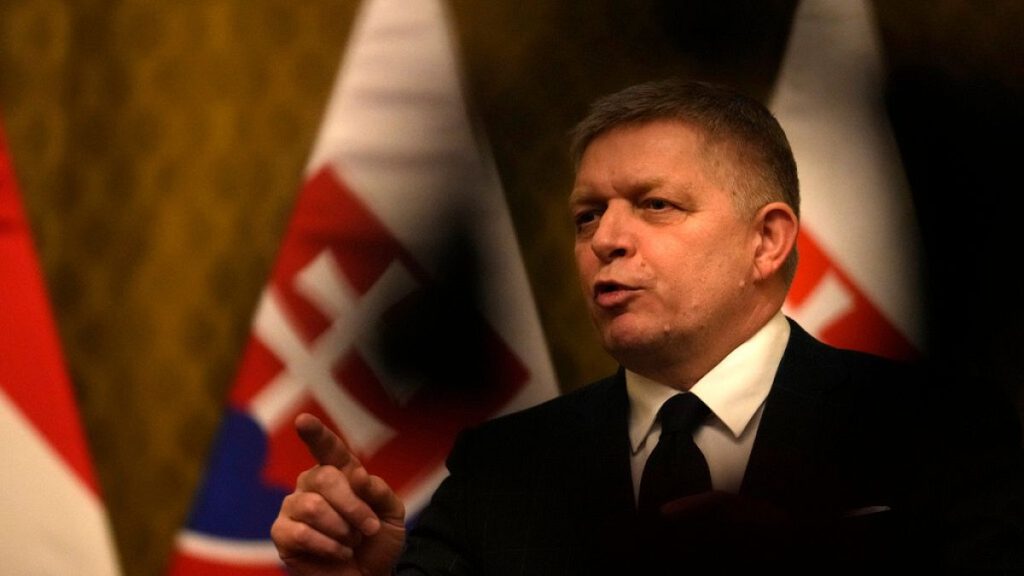The political landscape in Slovakia is currently embroiled in a tumultuous power struggle, centered around Prime Minister Robert Fico and his alleged pro-Moscow leanings. Fico, who returned to power last year following his Smer party’s victory on a populist platform, has faced mounting opposition and public protests stemming from his perceived alignment with Russia, particularly in the context of the ongoing war in Ukraine. These concerns have been exacerbated by Fico’s visit to Moscow last December to meet with Vladimir Putin, his criticism of NATO and the EU, his threat to cut aid to Ukrainian refugees in Slovakia, and his vows to block Ukraine’s NATO membership and denounce EU sanctions against Russia. This perceived shift in foreign policy has fueled accusations from the largest opposition party that Fico is attempting to steer Slovakia away from its established alliances within the EU and NATO, creating a deep rift within the country’s political sphere.
Fico has vehemently denied these accusations, framing the opposition’s actions as an orchestrated “coup” designed to destabilize his government and seize power undemocratically. He has reaffirmed Slovakia’s commitment to both the EU and NATO, rejecting claims of any foreign policy reorientation. While acknowledging the public’s constitutional right to protest, Fico has expressed concerns about the potential for these demonstrations to be exploited and escalate into confrontations with security forces. He alleges the existence of a structured effort to leverage the protests for destabilization and to undermine the government’s ability to function effectively. This narrative of a planned coup attempt serves to portray Fico as the defender of democratic processes against a power-hungry opposition.
The opposition’s push for a no-confidence vote against Fico highlights the intensity of the political standoff. While Fico survived the initial attempt, the opposition’s walkout from the parliamentary debate in protest of partial privatization of the session demonstrates the deep distrust and animosity between the opposing factions. This procedural maneuver further underscores the escalating tensions and the opposition’s determination to challenge Fico’s leadership. The interplay between accusations of a coup attempt and the no-confidence vote reflects a broader struggle for control over Slovakia’s political future and its alignment within the international community.
Fico’s stance on Ukraine has further fueled the controversy. His threat to withdraw financial aid from Ukrainian refugees residing in Slovakia, following Kyiv’s decision to halt the transit of Russian gas through its territory, has drawn sharp criticism. This move, along with his previous pronouncements against supporting Ukraine’s defense against Russian aggression, positions him as sympathetic to Russia’s interests, further solidifying the perception of his pro-Moscow stance. This perceived alignment with Russia against Ukraine resonates deeply within the context of the ongoing war and amplifies concerns about Slovakia’s foreign policy direction.
Fico’s populist platform, which resonated with voters and secured his return to power, plays a significant role in this political drama. His promises to cease aid to Ukraine and prioritize domestic interests likely appealed to a segment of the population weary of international commitments and focused on internal issues. This populist rhetoric, however, complicates Slovakia’s position within the EU and NATO, potentially straining relationships with allies and raising questions about the country’s commitment to shared values and responsibilities.
The ongoing protests and political maneuvering in Slovakia represent a critical juncture for the country’s future. Fico’s perceived pro-Moscow stance, his populist rhetoric, and his confrontational approach towards the opposition have created a deeply polarized environment. The accusations of a coup attempt, the opposition’s drive for a no-confidence vote, and the public demonstrations all reflect a profound struggle over the direction of Slovakia’s domestic and foreign policies. The outcome of this power struggle will have significant implications for Slovakia’s relationship with its European partners, its stance on the war in Ukraine, and the future trajectory of its democracy.














